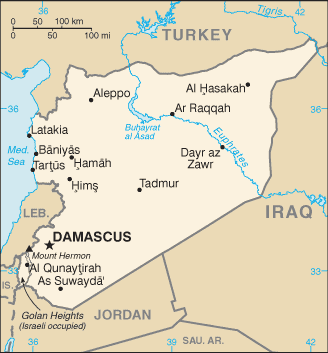Talk of increased Russian military involvement in Syria has the various rebel factions simultaneously conceding that it’s a setback to their civil war, and one that’s liable to extend the conflict many additional years, while threatening huge Russia casualties and “another Afghanistan” for the troops being deployed.
 The rebels are trying to shoehorn the model of the 1979-1989 Soviet occupation of Afghanistan on the war, pushing the idea of forming a new mujahideen to combat the Russians. The differences are stark, however, as this war has been ongoing for years before there was a hint of increased Russian involvement, and ISIS is the major power in Syria at this point, at least from a territorial perspective.
The rebels are trying to shoehorn the model of the 1979-1989 Soviet occupation of Afghanistan on the war, pushing the idea of forming a new mujahideen to combat the Russians. The differences are stark, however, as this war has been ongoing for years before there was a hint of increased Russian involvement, and ISIS is the major power in Syria at this point, at least from a territorial perspective.
Indeed, the increased involvement is at this point largely speculative, with Russia denying that anything they’re doing is really “new” but rather just a fulfillment of existing military deals with Syria. The “escalation” has been heavily hyped by US officials, who have lashed Russia even though they’re nominally both opposed to ISIS.
The Islamist faction, led by al-Qaeda, which has been trying to push into Latakia is blaming Russia for the increased resistance they are encountering, saying it shows that Russia is “taking the lead,” though most of the battles there haven’t been against the Syrian military in the first place, but rather against local Alawites, supportive of the government, who rightly believe they’ll be wiped out if al-Qaeda seizes their coastal homeland.
Russia’s primary interest in Syria has always been their naval base in Tartus, which could be imperiled if the Syrian government is completely wiped out, yet the claims by secular FSA rebels that the Russian government is opposed to a “political solution” is a flat out lie, as Russia has been trying to get the FSA and the other rebels to talk political settlement for years, with those rebels ruling out anything short of complete regime change.
Some of those meetings occurred as recently as last month, and an attempt by Russia to organize “unity government” talks collapsed quite recently on the refusal of the FSA and other rebels to even take part. Though the US at time gave lip service to the “unity” idea, they have similarly insisted recently that any “deal” needs to amount to full regime change, ousting Assad and his inner circle in favor of pro-US figures.
That’s where the big problem lies, as Russia believes, and probably rightly so, that installing a pro-US regime will cost them their naval base, the only Russian base in the Mediterranean.


